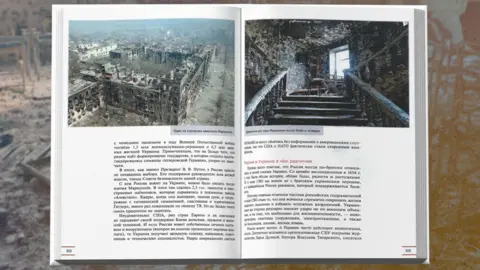It has been designed for a new subject entitled “Fundamentals of Security and Defence of the Motherland”.
The lesson is compulsory for high school students aged 15 to 18 in Russia and occupied territories in Ukraine.
It will be taught once a week from September, replacing a lesson known as “Fundamentals of Safe Living”.
Former soldiers are expected to teach the new subject and Russians with a degree in pedagogy – the method and practice of teaching – who return from the war are already being offered free retraining courses to become teachers.
The first textbook for the new subject, called The Russian Army in Defence of the Fatherland, has been produced by leading Russian education publisher Enlightenment. Among its authors are two senior figures who work for the defence ministry and Kremlin newspaper Rossiiskaya Gazeta.
Its 368 pages are filled with stories describing the “heroic achievements of Russian soldiers” from the 13th Century to the present day.
“Dear colleagues, we all understand the importance of presenting information to our students from the perspective of [Russia],” publishing representative Olga Plechova told an online introductory session for teachers in January, which the BBC watched.
“We cannot convey alternative viewpoints to the students. So this textbook will assist you in addressing children’s questions and providing accurate coverage of certain events.”
The book’s authors praise Soviet dictator Joseph Stalin and celebrate Soviet victories in the Great Patriotic War, as Russians refer to World War Two.
They also acclaim the role of the Russian military in seizing Ukraine’s Crimean peninsula in 2014, which they term the “reunification of Crimea with Russia”.
The schoolbook also devotes a section laced with distorted history to explain Russia’s full-scale invasion of Ukraine, using the Kremlin term “special military operation”.
“When there was a coup d’état in Kyiv in 2014, the new government initiated a crackdown on everything Russian,” the authors assert, before making a series of false claims.
“Russian books were burned, monuments were destroyed, Russian songs and the Russian language itself were banned… ‘Russian blood’ cocktails were served in restaurants.”
“Cities in the Luhansk and Donetsk regions, where dissent against such policies existed, were bombarded by Nazi shells and rockets.”
The authors state “it was Ukraine and Nato who planned to start the war”, bizarrely suggesting “a huge number of Ukrainian troops and armoured vehicles were concentrated at the borders”.
In fact it was Russia that massed more than 100,000 troops both along its border with Ukraine and in Belarus, ostensibly for joint military exercises, only to launch its full invasion on 24 February 2022.
Ukrainian political analyst Volodymyr Fesenko sums up the textbook as “all misinformation and lies”.
The book goes on to claim falsely that the Ukrainian port city of Mariupol, which was pounded for almost three months by Russian bombing, was destroyed during battles with “Nazis” and “foreign mercenaries”.

“Russia fights with integrity,” the authors insist. In several excerpts, they suggest Russia prioritises the safety of Ukrainian civilians and minimises destruction, while “Ukraine frequently targets civilian infrastructure”.
During the winter of 2022-23, Russia destroyed more than 40% of Ukraine’s electricity infrastructure with more than 1,000 missile and drone attacks, according to Kyiv figures.
As for Russian integrity, Mr Fesenko says there are plenty of examples proving exactly the opposite. “We all remember the tragedy in Bucha, where dozens of Ukrainian civilians were killed by Russians and women were reportedly raped.”
Another section of the book starts with an in-depth overview of the structure of Russian Armed Forces and increasingly calls for over-18s to sign up for the army.
The textbook lists the required documents and links to the application form as well as nearby addresses for enlistment. It highlights military benefits like free medical care and insurance, attractive salary and three meals a day.
Young men from occupied Ukrainian territories, such as Crimea and Donbas, who have been subject to aggressive propaganda for 10 years and have little opportunity to earn money, may be enticed by these economic bonuses, warns Olha Skrypnyk, head of a Crimean human rights group.
The schoolbook may help increase the numbers joining the military, she believes: “So these children go to war and die.”
Russia does not give details of its casualties in the war in Ukraine but in two years of war, at least 1,240 soldiers under the age of 20 were killed according to open-source information confirmed by the BBC’s Russian service.

































Discussion about this post